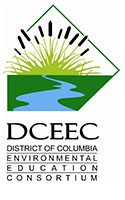Virtual Lunch & Learn Series – Winter 2025
Interested in connecting the dots between outdoor learning, environmental literacy, and social studies? Want to gain a better understanding of what meaningful watershed educational experiences might look like on school grounds? Hoping to connect with others who are doing work in this space, too? If so, join us for this three part virtual lunch and learn series to explore these topics, and more!
Each virtual session takes place from 12:00-1:30pm. Please register for one or all of the sessions. And invite others!
February 3, 2025 | Outdoor Field Experiences: Shifting to Student-Led Place + Problem Based Learning
We will kick off this series by diving into student-led problem finding in the schoolyard. This is a foundational orientation shift in the National Oceanic and Atmospheric Administration’s (NOAA’s) Meaningful Watershed Educational Experiences (MWEE) from far off outdoor experiences, to experiences that take place locally, in and around their schools and reflect their lived experience. Sarah Jennings, former District of Columbia Public Schools (DCPS) educator and now program manager at Earth Force, will help orient people to this pedagogical approach, alongside MWEE ambassador and trainer, Adrienne Farfalla, environmental protection specialist with the Department of Energy and Environment (DOEE). Prior to the session, participants are encouraged to complete the MWEE 101 training.
- Recommended audience: anyone who works directly with students or plans student programming.
Register here.
March 3, 2025 | Social Studies + Environmental Literacy
In the second session, Madison Kantzer, instructional systems specialist for social studies, and Grace Manubay, environmental literacy coordinator, at the Office of the State Superintendent of Education (OSSE) will provide an overview of the new social studies standards that were adopted in 2023 and share how the Environmental Literacy Framework will be updated to incorporate these new standards. Earth Force will also cover the curricular supports being created for release in the summer of 2025, which will show how environmental literacy is being woven into the sixth-grade world geography curriculum. Feedback is welcome and partners will be identified to help support the alignment of environmental literacy and social studies that is written into the curriculum! Prior to the session, participants are encouraged to review the social studies standards.
- Recommended audience: Anyone who works directly with students or plans student programming.
Register here.
Postponed! New date TBD| Mapping Environmental Literacy Programming for Systemic MWEEs
A systemic meaningful watershed educational experience (MWEE) is defined by all students in a local education agency (LEA) having three or more MWEEs throughout their K-12 experience (i.e., at least one experience in elementary, middle, and high school) in various subject areas. In the final session of this series, Earth Force will review the Outdoor Learning ArcGIS Map of DC environmental partners and conducting a Strengths, Weakness, Opportunities, and Threats (SWOT) analysis using the data. Our goal is to gather information about who is working where, with what grade level, with what champion educators, in what subject areas and to determine who can support place-based outdoor experiential learning with the goal of getting to a systemic MWEE. This is an opportunity to find collaborators, to use this data to plan for environmental literacy engagement equitably, and see opportunities for partners to crosswalk their materials and programs. Prior to the session, participants are encouraged to visit the Outdoor Learning Resource Hub and follow the link to explore the Outdoor Learning ArcGIS Map. Please come to the conversation prepared to discuss current partnerships and strategic outreach goals.
- Recommended audience: anyone who is responsible for developing school partnerships and collaborates with other organizations.
Register here.
About the organizers:
- The Environmental Education Networking Committee of the DC Environmental Education Consortium (DCEEC) taps the District’s environmental education expertise to enrich the DCEEC community with professional development opportunities, such as Lunch and Learns, listening sessions, field outings, and trainings.
- A collaboration between its environmental literacy and school garden programs, the Office of the State Superintendent of Education (OSSE) hosts Outdoor Learning Gatherings for educators seeking resources and inspiration to engage students in activities that benefit from being outdoors and in nature.
- A leader in environmental action civics, Earth Force received a NOAA Chesapeake Bay Watershed Education and Training grant to embed environmental literacy in social studies through the integration of a MWEE into the forthcoming sixth grade DC Public Schools (DCPS) social studies curriculum.
